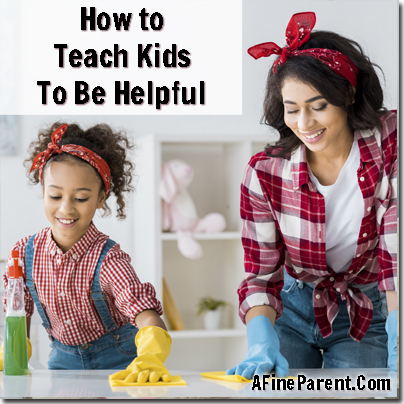 I was at my son’s school to check him out early for an appointment. While I waited for him, the school secretary commented on what a nice, helpful kid my son is.
I was at my son’s school to check him out early for an appointment. While I waited for him, the school secretary commented on what a nice, helpful kid my son is.
“Really?” I replied, hoping she would say more.
“Oh yes, just the other day, it was raining and several girls forgot their umbrellas. Your son took his jacket off and held it over their heads while they were waiting in the carpool line so they wouldn’t get wet!” she said.
Smiling, I thanked her for the compliment, but I wasn’t surprised. I could picture my son doing that!
That’s when I realized his actions at school were the actualization of a lifetime of lessons that family, friends and teachers have gifted to my son. We’ve worked hard to teach him to be helpful through conscious attention to teaching helpfulness as a skill.
Teaching kids behaviors like helpfulness is an endeavor that starts when they are babies and continues until they leave home, and it’s influenced by everyone our kids come in contact with. I suppose you have heard the saying “It takes a village”? How true that saying is!
That’s why it’s important to expose our kids to the people that will be the best role models. To give them age-appropriate toys and entertainment that aligns with your family’s values. To know who their friends are and the ideas they are being exposed to. And to give them the best education we can find.
Helpfulness is a wonderful character trait to teach our children. I’ve read that kids are like sponges; they soak up everything! You see, learning doesn’t start on the first day of school. Learning starts the day they are born!
Here are some ideas I’ve found invaluable in learning how to teach kids to be helpful at any age!
Babies
 Babies take in all the information they know by hearing and seeing. As parents, we are the first teachers. That’s an honor and privilege to be certain! What we say and how we say it matters from day one.
Babies take in all the information they know by hearing and seeing. As parents, we are the first teachers. That’s an honor and privilege to be certain! What we say and how we say it matters from day one.
Babies will sense your mood, listen to the sound of your voice and pick up on your facial cues. When you are calm, your baby will be calmer. If you talk in a calm, soothing voice, your baby will become quieter. When you smile, they will smile back. Your mood will influence their mood. “Children frequently hear more in the tone of voice than in the words we use” as noted by Rudolf Dreikurs, M.D. in his classic book Children the Challenge.
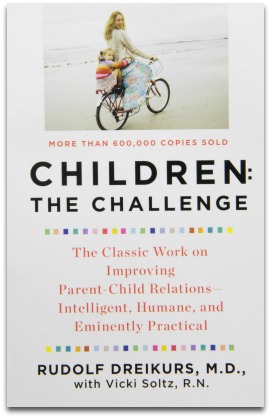 Your behavior, attitude and demeanor will first be observed and later mimicked as babies learn about the world around them through their first interactions with their parents and caregivers.
Your behavior, attitude and demeanor will first be observed and later mimicked as babies learn about the world around them through their first interactions with their parents and caregivers.
They will hear every “please” and “thank you” that you say. When they start to talk, they will mimic what they have heard. Most importantly, what you say and how you say it will be their first lessons in learning to be helpful themselves later on.
Likewise, bad language and angry inflection will be mimicked when babies start to talk. When my son was very young he repeated a couple of bad words he overheard. Instead of ignoring it or finding it funny and laughing, we sprang into action each and every time he uttered an “off-limits” word. Gentle reinforcement and explaining which words we do not say a few times was all it took for him to get the message that we have boundaries in our family. Besides, now he holds me accountable for my occasional slips!
Toddlers
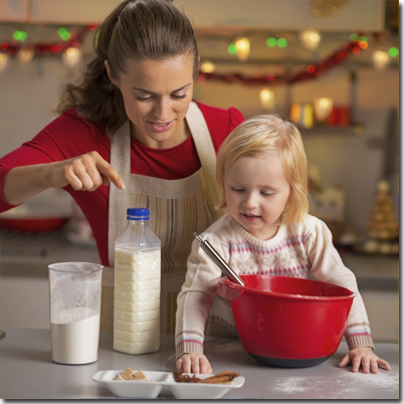 Toddlers take in the world by touching, doing and asking WHY? Why? Why?
Toddlers take in the world by touching, doing and asking WHY? Why? Why?
Let that question be music to your ears. Here is WHY: Why is the greatest question in the world.
Wanting to know why is the spark that starts kids on the path to learning and wanting to learn more! The smartest people in the room are those who asked why the most in school.
I read an interesting article in LIVESCIENCE called Why Kids Ask Why, which explains how important answering the why questions at this age matters.
According to this article, a new study of toddlers aged 2 to 5 suggests they are more active about gathering knowledge at this age than previously thought. This is the perfect time to give them good answers which help enforce important character concepts like teaching kindness.
So, challenge yourself to push aside the annoyance when you feel like you can’t answer one more WHY to find real and meaningful answers.
For example:
- When you buy those delicious Girl Scout Cookies they have asked for, explain that buying those cookies helps the girls selling them earn money for their club.
- As kids pick up their toys and put them away, tell them “Thank you for helping keep the house clean.”
- When you put the trash in the trash can, explain that you are helping the trash collectors do their jobs and helping the earth by keeping it clean.
- If someone holds a door open for you, remember to say “Thank you for helping me,” or “That’s so kind of you.”
Continue to illustrate helpfulness in your language and actions. Your kid(s) are looking, listening and learning!
School-Age Children
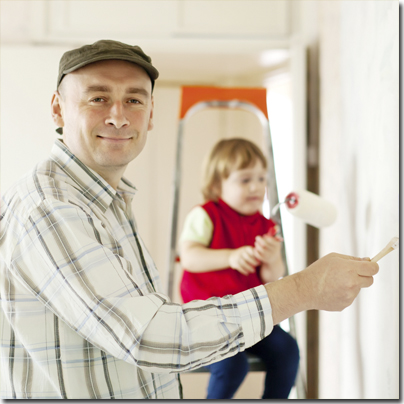 School-age children want to be involved! Start encouraging them to find ways to help others. Focus on actions that stimulate creativity, give them a sense of fun and get them involved in active ways.
School-age children want to be involved! Start encouraging them to find ways to help others. Focus on actions that stimulate creativity, give them a sense of fun and get them involved in active ways.
Encouragement is one of the most important aspects of child rearing, according to the authors of Children the Challenge. They go on to note that the lack of proper encouragement can be “considered the basic cause for misbehavior.” Encouragement is THAT important!
Here are some examples:
- Do your kids like to draw? Most kids do! Encourage them to make a get-well card for a sick friend or family member.
- Do you have a family pet? Give them the responsibility of feeding and walking the family dog, or brushing the cat’s fur. Teach them that it helps the pet stay healthy and happy.
- Do you recycle? Teach your school age children how recycling helps the planet. Make them in charge of filling up your recycle bins (just make sure what they put into them is meant to be thrown out!).
- Give them small jobs to do around the house and praise them for helping without complaining. Resist giving bribes or allowances for being helpful. Helping comes from the heart!
Bribing children for acting a certain way or co-operating with what we want them to do may work in the short term but eventually fails because it teaches the child to comply only when they get rewarded.
As noted in Children the Challenge: “Children don’t need to be bribed to be good. They actually want to be good.” So encourage the behavior you want to see and keep reinforcing it with thanks and praise.
Often kids only need a little encouragement to learn to help others in small ways. The lesson they will be learning is BIG: every way of helping matters.
Big or small, every kindness counts. Kids love feeling big and important because they spend a lot of time in their day feeling like they don’t know enough or aren’t old enough yet to do what they want to do. Let them know they are not too small to help out!
Preteen and Teen
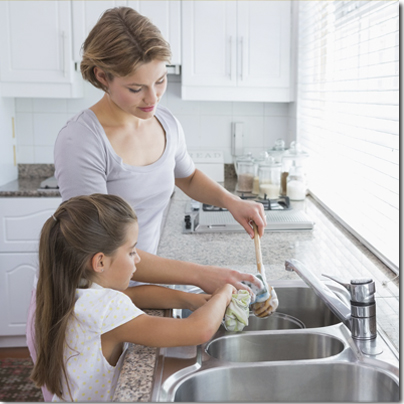 Preteens and teens want to become more independent and start to make decisions on their own. Christine Carter Ph.D., writing for Psychology Today.com, explains that “once kids reach adolescence, they need to start managing their own lives.”
Preteens and teens want to become more independent and start to make decisions on their own. Christine Carter Ph.D., writing for Psychology Today.com, explains that “once kids reach adolescence, they need to start managing their own lives.”
Here, too, is an opportunity for you to mentor their skills of helpfulness while encouraging interests in areas which will help ease them into more independence.
Does your teen have a special hobby or interest you can share and explore together? As a preteen, my son expressed an interest in space. We joined the National Space Society and started attending meetings. Many nonprofit organizations, like this one, need volunteers to help during community events. In no time my son started to volunteer for this organization because it was fun and his contribution was so appreciated.
Volunteering is the perfect way to help kids learn the lessons of civic duty and find ways they can impact their community. It takes the lessons of being a helpful person outside the family and out into the bigger, wider world!
Now that my son is older, he has chosen other organizations to volunteer with independent of us.
Check out some of the nonprofit organizations in your area to see at what age they will accept volunteers. You will be surprised that many will allow teens to help out.
Here are just a few examples:
- Pet shelters need donations of food and toys but also volunteers to come spend time with the animals.
- If you attend a church, temple, or other place of worship, there are endless ways for teens to help out, from serving snacks, to teaching summer camps for younger kids, to going on mission trips.
- Summer programs are always looking for responsible teen volunteers as are museums and zoos. My son volunteers as a teacher’s aide at the summer camp he attended when he was younger. His spirit of helpfulness actually impressed the staff so much they asked him to return when he outgrew the program!
Besides the feeling of goodwill your teen or preteen will get from doing volunteer work, other benefits may be the hours they serve counting toward National Honor Society requirements or service hours required by their school.
These are just a few examples that illustrate ways you can teach your child the value of being helpful at every age.
Being a person who is giving and helpful can be easy, fun and rewarding, whether it’s in the service of a friend, family member, animals, your local community or the planet!
Grown-Ups Have a Role Too!
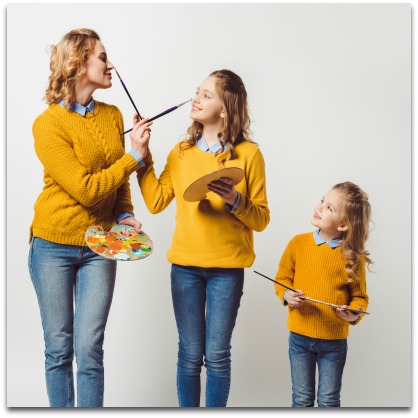 Encourage kids everyday by modeling the behavior you want them to learn. Kids will quickly see through you if you talk about being helpful but don’t show them that it’s a priority in your own life.
Encourage kids everyday by modeling the behavior you want them to learn. Kids will quickly see through you if you talk about being helpful but don’t show them that it’s a priority in your own life.
- Common courtesies count: Remember to say please and thank you!
- Teach by example: Try to hold your tongue when someone cuts you off in traffic or cuts to the front of the line. Use these opportunities to teach your kids calmness and kindness to others.
- Encourage kindness while going about your daily business: Open doors for others, return shopping carts to stores and even loan people your umbrella when it’s raining.
- Take an active role when mentoring older kids until they are independent enough to go solo.
The 2-Minute Action Plan for Fine Parents
For our quick contemplation questions today, please ask yourself:
- How often do I respond helpfully when my kids ask why?
- How often do I encourage my kids to get involved and help others?
- Who could I ask to learn more about organizations where my kids and I could volunteer?
Hopefully these ideas will help you find unique ways to keep engaging your kid(s) to look for ways to be helpful, big or small!
The Ongoing Action Plan for Fine Parents
Get the whole family involved in ways to teach helpfulness.
Take advantage of the time the whole family has together during holiday breaks and summer vacation. Plan some family events that include volunteering for good causes in your community:
- Help at a food pantry or serve lunch at a soup kitchen.
- Spend an afternoon at the mall during the holiday season selecting gifts for others that can be donated at a charity in need.
- Plant a tree together on Earth Day because we all need to show the Earth more kindness too!
- Join a club and go to meetings together. Volunteer on the Board of Directors at the club, and your teen will start learning leadership skills and how to be helpful as you model it for them.
- Encourage your preteen or teen to volunteer at clubs and causes they choose on their own at school or in the community, and clear away obstacles they may have like transportation or funding.
Thanks for saying so!
Really amazing and I loved this so much.
Very useful and informative article. I like to make different lists and share them with other people, now I am compiling lists on many topics, how to raise children. If you do not mind, I would borrow some of your ideas! Thank you.
Your content was full of amazing thoughts! This was what a mom wants for their kids to practice. Gaining a lot more ideas for my daughter. Thanks!
I’m so glad you got some ideas to build upon!
Thanks for the feedback!
Thank you!
Thank you! I’m glad you enjoyed it.
What a well-written and informative piece! Really lovely advice!!
This is a great article! I don’t have kids but I know a lot of people who do and this will help them.. A LOT! This article will also help me when I’m around children & teenagers. Because they learn not only from the parents but also from the people that are always around. Like an Aunt or Cousin..etc. 😁
Your right- everyone can be a great influence on kids of all ages- we teach by example!
That’s fantastic! I truly believe kids will help if we show them how –
Very helpful. Thanks!
I try to give my preschoolers responsibilities like cleaning their rooms, picking up their leftovers after they have finished eating and a little help when I clean. Most of the work I do as a mother. Maybe some motivation and they can get to understand their responsibilities, as mama already has a lot on her plate.
I love how the ideas proposed are so simple and easy to incorporate into our everyday lives. Thanks for writing this Laura.
Hello Sanya-
I’m glad you found some useful tips!
Thanks for the comment.
Laura
This is very insightful..I can say that I have learnt a couple of things that I will encourage the children to do. I am philanthropic, and easily help people. I just hope that it rubs off on the kids too.
Evah, From KENYA
Hi Evah-
It sounds like your are right on track to teach them by showing them your giving nature!
Thanks,
Laura
Thanks Sarah! I’m glad you enjoyed it and I appreciate the feedback.
I love this! Thank you for having suggestions for different age groups, that is so helpful!
Very helpful. Thanks Laura
I’m glad you found it helpful!